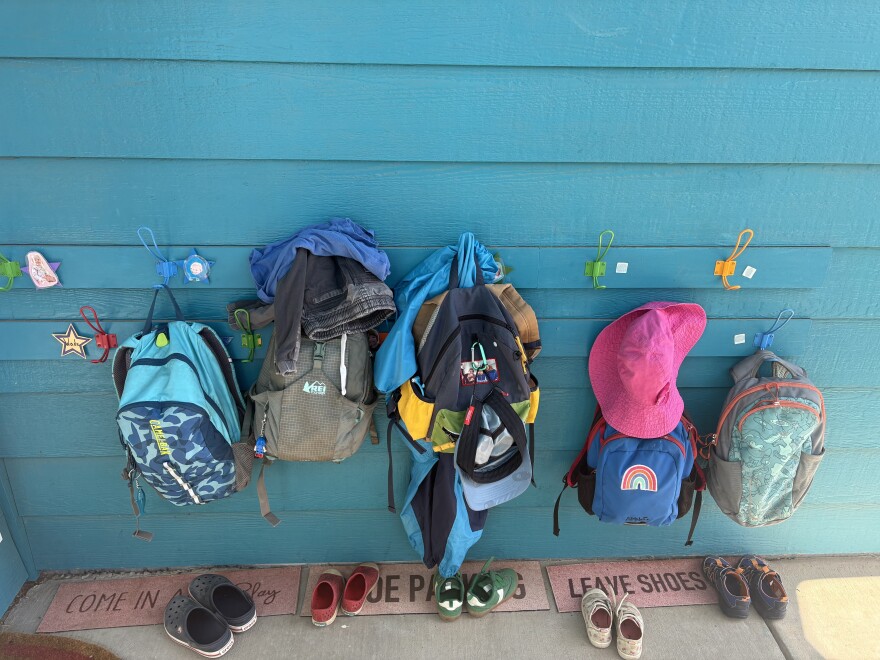Six years ago, when Emily Bond and her husband first thought about starting a family, she never considered the cost of child care.
Bond grew up in Grand Junction and New Castle, and when she gave birth to her first son, Sawyer, at 23, she assumed she would raise a family on Colorado’s Western Slope too.
However, in the months after giving birth, Bond discovered licensed day care would cost more than her mortgage.
In 2023 and 2024, Bond was working four jobs, and her husband was working two. “We were still barely making it with child care,” she said.
Bond’s situation was familiar to Maggie Tiscornia, the director of Confluence Early Childhood Education Coalition. The coalition started in 2017 with the goal of making child care more affordable and accessible between Aspen and Parachute — one of the most expensive regions in the U.S.
CECE is working to establish a special tax district in Garfield, Eagle and Pitkin counties that would boost funding for child care with a 0.25% sales tax — money that would support providers and families through grants and scholarships.
Only 44% of kids in the Roaring Fork Valley currently have access to licensed child care providers, while downvalley, from Glenwood Springs to Parachute, it’s just 29%. That makes the region a “child care desert,” said Tiscornia.
Families who are lucky enough to find child care face exorbitant costs, she said, adding that child care tuition for a family with two children ranges from $2,500 to $3,800 per month, or an average yearly cost of $17,000 per kid.
Studies show that children with access to high-quality early childhood care are better prepared for kindergarten, read earlier, finish high school and go onto college at higher rates.
For Tiscornia, who lives in Carbondale and has two children, the issue feels personal. When she got pregnant with her first child, she put her name on waitlists at several day cares in the Roaring Fork Valley. It took a year after she gave birth to find an open spot.
“Even then, we've struggled with getting the days we need and being able to afford it,” she said. “So especially with two kids, we can only afford three days a week.”
Tiscornia and her husband are often “piecing it together,” she said, by switching around their work schedules and relying on her parents, who live nearby.
However, many families aren’t as fortunate. Tiscornia has heard from mothers forced to drop out of the workforce and families who live with an empty fridge to cover their child care expenses.
“It’s really one of our family's greatest expenses, right up there with housing,” she said.
Hard choices
In search of a solution, Bond turned to Facebook. She found a neighbor willing to look after Sawyer, who charged less than a licensed day care, but after he was injured there, she was too afraid to go back or leave Sawyer with strangers again.
Less than a year later, in 2023, Bond gave birth to her second son, Benjamin. Full-time, in-home day care for both kids cost her $2,400 a month, which she and her husband couldn’t afford long term.
Instead, she tried to find babysitters she knew, sometimes taking her kids to a different house every day.
Sawyer especially struggled with the inconsistency. Bond tried to use sitters who offered educational activities and took the kids outside, but they usually charged a premium, so Bond often opted for less expensive alternatives.
The decision made her feel guilty, she said. “I kind of felt like I was choosing: money over my child,” she said. “But it was just so hard to afford it.”
Providers struggle
Ali Cottle runs Thompson Schoolhouse, a day care she operates out of her home in Carbondale. In an area where child care costs are so high, Cottle often feels like she’s pitted against families.
Some people expect her to only charge a minimum because she’s operating an in-home day care, but they also want her to create a high-quality experience for their children.
To pay for organic snacks and a safe 12-passenger van — in addition to her own bills — she has to charge more. To comply with Colorado’s licensing requirements, she’s also limited to six kids: five including her own 3-year-old.
According to data from CECE, the median wage of a lead day care provider in the Parachute to Aspen corridor is $24 per hour. In a 2024 survey, more than half of providers said they had thought about leaving the field due to low pay, long working hours, and burn out.
Cottle feels like she’s stuck between a rock and a hard place. “I have to charge a number that a lot of people view as being too high,” she said. “If I was on the other side of the spectrum, I would agree with that.”
A region-wide solution
The constant child care stress was starting to put a strain on Bond’s relationship with her husband. He worked from 5 a.m. to 7 p.m. most nights. One day a week, he worked a second job from 6 p.m. to 11 p.m, which left Bond to drop off and pick up the kids while trying to run her own business.
“I was having to cut my work schedule short so that I could pick them up according to the babysitter schedules,” she said.
Bond eventually reached her limit.
“You know what,” she told her husband. “We should move to Minnesota.”
Bond’s retired in-laws live there and could help take care of the kids. In April 2023, the family sold their house in Parachute and moved to Waterville, Minnesota.
For Tiscornia, Bond’s story illustrates the urgency of the child care crisis and why Confluence Early Childhood Education Coalition is trying to establish a new tax district.
The district won’t create any additional child care facilities, but the estimated $10 million a year in sales tax revenue will fund grants to day cares, allowing them to open new locations, support licensing assistance for home-based providers and provide tuition subsidies for families.
Earlier this year, county commissioners in Pitkin, Eagle and Garfield counties endorsed the plan. The coalition has also gathered more than 1,000 signatures throughout the region in support of the initiative. According to Tiscornia, 95% of people they asked agreed to sign.
In November, the Early Childhood Service District will be on the ballot. If voters approve the plan, the special district would be the first of its kind in Colorado — and one of only a few in the country — devoted to childcare.
The coalition’s plan, however, came too late for Bond.
She and her family are settled in Minnesota now where life is a lot cheaper. Sawyer misses his friends back in Colorado, but Bond is happy to have a house on a lake with land where her kids can play.
“The child care situation kind of remains the same at the moment,” she said, “But with pricing and stuff out here, I think it'll work out better.”
This story is part of Aspen Public Radio's “Cost of Living” series, which is supported by a grant from United Way of Eagle River Valley.




